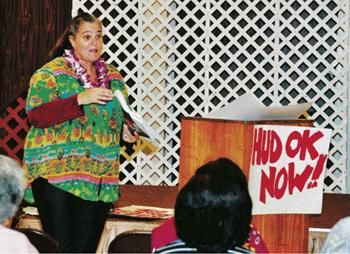With hundreds of indigent residents struggling to find a place to live, the Kaua‘i Fair Housing Law Coalition took its first steps toward enacting legislation that would ban income source discrimination at its inaugural meeting, Thursday night at the War Memorial Convention Hall in Lihu‘e.
Representatives from county and state agencies were among some 20 attendees who participated in a group discussion of the issue, led by organizer Anne Punohu and former mayor and Kaua‘i County Councilwoman JoAnn Yukimura.
In her opening remarks, Punohu referenced previous discrimination issues, from slavery to women’s suffrage to the civil rights movement, in specifying the importance of changing the law to provide full equity to all segments of society.
In particular, Punohu believes landlords that advertise their property with notes like “No HUD” — referring to the United States Department of Housing and Urban Development programs providing housing funds for those in need — are discriminating against a particular group based on their entirely legal means of income, and said she is working with county and state legislators to introduce bills calling for an end to that type of discrimination.
Because HUD rules require applicants to have their income verified every 120 days, those who are approved and receive HUD vouchers but are unable to find a property that will accept HUD within four months see their vouchers expire, said Sandy Kaauwai, program manager for the county Housing Agency’s Section 8 Housing Choice Voucher Program yesterday.
At that point, the applicants see their names go to the bottom of the list, some 500 names long, where they need to wait between six months and a year for another shot at housing, she said.
Pua Vidinha, a Kalaheo neighbor of Punohu’s who helped organize the meeting, said from personal experience, “It’s a headache to go through it and then be unable to find a place that takes HUD.”
Another attendee, who only identified herself as Aggie, said she has often come close to securing a rental, only to be rebuffed at the last moment.
“Everything sounds great until you get to the part where you ask ‘do you accept HUD?’” she said yesterday. “The answer is no, over and over and over again.”
At the meeting, Kaauwai told the group that 60 percent of approved HUD vouchers expire without being used. That number is actually lower than the 80 percent that go unused on other islands, she said. Punohu said at the meeting she had made telephone calls to more than 250 listings in The Garden Island that specified “No HUD.”
Punohu provided a pair of similar laws that have already been enacted across the country — one at the state level in Maryland and one at the county level in California — to serve as starting points for local legislation.
State Sen. Gary Hooser, a Democrat representing Kaua‘i and Ni‘ihau, said yesterday that he had plans to introduce a bill during the upcoming legislative session.
“We’re going to be introducing a bill to basically say ‘(when) you advertise, you can’t discriminate from income source,’” he said. “We introduce about 2,000 bills a year, so we’ll see what happens.”
The proposed law would not require landlords to participate in the HUD program, but simply open the door for the possibility and make advertised discrimination illegal.
“All (the proposed legislation) really does is allow the HUD voucher holder to apply with everyone else and level the playing field for them,” Kaauwai explained. “It doesn’t give them any advantage, it just gives them a shot.”
Another approach that could yield positive results is to simply better educate landlords on how HUD works, said county Housing Agency Director Eugene Jiminez, who was in attendance.
“I suggested educating the landlords should run concurrent with whatever plans they have to change the law,” Jiminez said in a phone interview yesterday. “In June we’ll be having a housing fair with the Kaua‘i Board of Realtors and we’ll do something to try and address this.”
JoAnne Georgi, who identified herself as a local landlord who does accept HUD, agreed.
“Education is the key. People are scared by what they don’t understand,” she said.
Punohu said she was optimistic the group could enact the change through legislation if not by changing people’s minds.
“I intend to see this happen for everyone who has gone through it. This is our opportunity to step forward,” she said at the close of the meeting. “We’ve got families out there right now that need help. It’s an urgent issue.”
Councilman Tim Bynum said yesterday that he admired Puhohu’s initiative and remained concerned about possible discrimination based on the source of income.
“Housing is important for everyone,” he said, agreeing that educating landlords about HUD is key.
• Michael Levine, staff writer, can be reached at 245-3681 (ext. 252) or via e-mail at mlevine@kauaipubco.com





